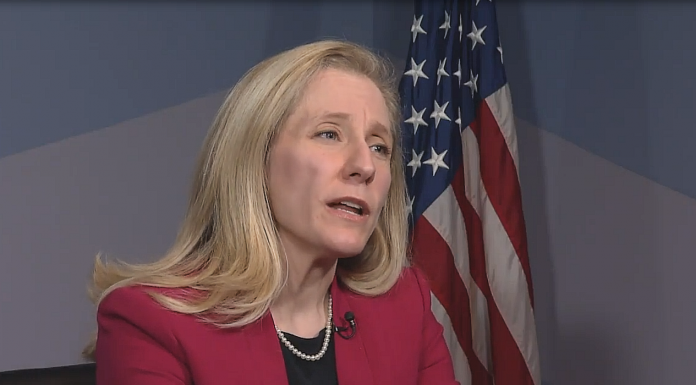(Headline USA) When discussing vulnerable Democrats who are likely to fall under a pending red wave in the 2022 midterm election, few names come as close to the top of the list as that of Rep. Abigail Spanberger, D-Va.
Only a few election cycles ago, Spanberger’s very district was the seat of powerful ex-House Majority Leader Eric Cantor, a Republican.
Spanberger herself benefited from a suburban wave of anti-Trump backlash in the 2018 election, where she ousted Rep. Dave Brat, who had challenged Cantor from the Right and won.
She benefited also from a Democrat “sue-till-blue” effort that forced the state legislature to redraw its legislative maps in ways more favorable to Democrats.
But no such advantage came of the commonwealth’s latest redistricting, which was determined by an independent panel without input from the Democrat-led legislature.
While several candidates—including Georgia gubernatorial hopeful Stacey Abrams and key Democrats in Pennsylvania races—have found their schedules suddenly constricting around the time of President Joe Biden’s visits to their states, Spanberger appears ready to accept the liability of being seen onstage with the deeply unpopular president.
Biden is trying to jump-start progress on his stalled domestic agenda by refocusing attention on one of his most popular proposals, limiting the cost of prescription drugs.
He was traveling on Thursday to Culpeper, Virginia, where White House press secretary Jen Psaki said the president will call attention to the “unacceptable” cost of medications.
“We need to act to stop the abuse of American families,” she said.
Joining him for part of the journey southward, about an hour’s drive from Washington, DC, will be Spanberger.
“He is eager to go out there and hit the road for Democrats who are fighting for an agenda for the American people,” Psaki said Wednesday.
After having run as a “Blue Dog” centrist in her two prior races, Spanberger’s voting record, largely consistent with the Left’s radical agenda, and her decision to court a Biden endorsement could force her to lean even farther into the leftist legacy—in a state that sent a clear mandate against it last November with the election of Republican Gov. Glenn Youngkin.
And that’s if all goes well. The risk of a Biden gaffe at any given public appearance also threatens to turn campaign stops into a political blunder.
Spanberger—a former deep-state intelligence operative who was endorsed by disgraced ex-FBI Director James Comey—is one of several Democrats who have raised alarms about slipping support from voters.
She suggested in a November interview with the New York Times that Biden had overreached with his plans for new government programs that recalled the Depression-era agenda of President Franklin D. Roosevelt.
“Nobody elected him to be FDR; they elected him to be normal and stop the chaos,” she said.
However, prescription drugs remain a politically safe focal point for Biden’s visit.
“I am grateful for the administration’s attention to this issue — but more than that, I look forward to hearing the president’s strategy for how we can sign a transformative prescription drug-focused bill into law,” Spanberger said in a statement when Biden’s trip was announced.
The decision to pursue a less divisive agenda and to have Spanberger help to jumpstart it may signal a drastic pivot for the beleaguered administration in a week where murmurs began to surface that Biden’s chief of staff and longtime confidante Ron Klain might be shown the door.
Efforts to lower prescription drug costs have long been popular with voters, but bipartisan consensus has proved elusive. It’s unclear if there’s a political path forward for Biden’s plans in Congress.
His proposals include capping out-of-pocket medication costs for Medicare recipients at $2,000 per year and insulin at $35 per month. In addition, Medicare would be allowed to negotiate prices for a limited number of prescription drugs and drugmakers would be required to pay rebates if they raise costs faster than inflation.
“It’s safe to say that all of us can agree that prescription drugs are outrageously expensive in this country,” Biden said Dec. 6.
The provisions are part of Biden’s expansive domestic agenda, known as “Build Back Better.” However, the legislation is at a standstill because of resistance from moderate Democratic Sens. Joe Manchin, D-W.V., and Kyrsten Sinema, D-Ariz.
By contrast, Spanberger’s support for the multi-trillion-dollar spending bill is one of many things that could come back to bite her in the coming election.
And, like a vampire draining the life from its victims, Biden’s visit may do more to drain her of any lingering cachet with moderates than it does to help her flagging hopes.
Adapted from reporting by the Associated Press

